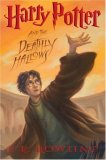“Harry Potter and the Deathly Hallows” is the seventh book in the “Harry Potter” series by J. K. Rowling. At least as of now, this book is supposed to be the final book in this series. So it was natural for me to wonder before picking it up whether it would provide a closure and a satisfactory resolution for this saga.
After having read the book, the answer seems to be a mixture of “yes” and “no” - yes, the hero prevails and evil is vanquished as expected; no, the resolution as it plays out cannot really be called satisfactory.
Unlike the previous books, the action in this book starts right away and the author more or less keeps the pace throughout (except for some boring pages describing the preparations for a marriage and perhaps too prolonged a description of the camping efforts of our heroes while on the run). It was a gripping read for me almost all the way through.
As the characters have aged, their thoughts and dialogues have matured. As their circumstances have become worse, the narrative has also become darker. The book has quite a bit of violence and several deaths. In fact there are some seemingly-gratuitous deaths as well. What started off as a series of books for children can no longer be called that.
For a plot that the author says has been forming in her head for several years, it has several glaring holes that become difficult to overlook. As has been the pattern in the previous books in this series, the heroes overcome seemingly-insurmountable hurdles through some very convenient and contrived turn of events. For example, magical objects like wands or snitches that had one set of properties in the previous books suddenly acquire new and very convenient properties in this book that just happen to solve a particularly vexing problem facing our heroes. As another example, the sword of Gryffindor becomes available to our heroes through some very contrived twists in the plot that is not even explained satisfactorily anywhere in the rest of the book. The author shamelessly resorts to deus ex machina a bit too often for my comfort.
Just as with “The Lord of the Rings”, I felt that here too the final battle with the main villain was a complete letdown. What is the point of hyping up the primary villain throughout the series if in the final battle he is vanquished without much of a fight? We should have something like the “boss” battles in video-games so that it feels really satisfying when the hero finally conquers the villain.
As in “The Chronicles of Narnia”, the author's deep Christian beliefs clearly show through towards the end of this book. This part looks really weird and I found it even more jarring than the other lacunae in the overall plot. As if this wasn't bad enough, the epilogue seemed completely pointless to me, except perhaps to tell us who married whom and what their children were called.
The “Harry Potter” series certainly makes for an interesting read, but the tale could perhaps have been told in fewer books and with a tighter plot without losing its charm. Granted that you have to willingly suspend disbelief to enjoy such fantasies, but even within that world there has to be a certain logical consistency for you to be able to sustain that joy.
Of course, capturing the collective imagination of children and adults alike and sustaining it over the course of ten years and about 3,500 pages is no small feat. Hats off to Joanne Rowling for pulling it off.
